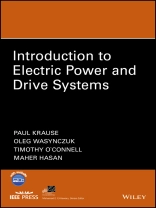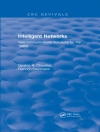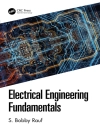An introduction to the analysis of electric machines, power electronic circuits, electric drive performance, and power systems
This book provides students with the basic physical concepts and analysis tools needed for subsequent coursework in electric power and drive systems with a focus on Tesla’s rotating magnetic field. Organized in a flexible format, it allows instructors to select material as needed to fit their school’s power program. The first chapter covers the fundamental concepts and analytical methods that are common to power and electric drive systems. The subsequent chapters offer introductory analyses specific to electric machines, power electronic circuits, drive system performance and simulation, and power systems. In addition, this book:
* Provides students with an analytical base on which to build in advanced follow-on courses
* Examines fundamental power conversions (dc-dc, ac-dc and dc-ac), harmonics, and distortion
* Describes the dynamic computer simulation of a brushless dc drive to illustrate its performance with both a sinusoidal inverter voltage approximation and more realistic stator six-step drive applied voltages
* Includes in-chapter short problems, numerous worked examples, and end-of-chapter problems to help readers review and more fully understand each topic
Зміст
ABOUT THE AUTHORS ix
PREFACE AND ACKNOWLEDGMENT xi
CHAPTER 1 BASIC CONCEPTS 1
1.1 Introduction 1
1.2 Phasor Analysis and Power Calculations 1
Power and Reactive Power 5
1.3 Elementary Magnetic Circuits 8
Field Energy and Coenergy 13
1.4 Stationary Coupled Circuits 16
Magnetically Linear Transformer 16
Field Energy 20
1.5 Coupled Circuits in Relative Motion 22
Field Energy 25
1.6 Electromagnetic Force and Torque 26
1.7 Elementary Electromechanical Device 32
1.8 Two- and Three-Phase Systems 35
Two-Phase Systems 35
Three-Phase Systems 37
References 40
Problems 40
CHAPTER 2 ELECTRIC MACHINES 43
2.1 Introduction 43
2.2 Fundamentals of Electric Machine Analysis 44
Concentrated Winding 44
Distributed Windings 47
Rotating Air-Gap MMF – Tesla’s Rotating Magnetic Field 52
Two-Pole Two-Phase Stator 52
Three-Phase Stator 56
P-Pole Machines 58
Machine Inductances 62
2.3 Two-Phase Permanent-Magnet AC Machine 63
2.4 Analysis of a Two-Phase Permanent-Magnet AC Machine 69
Transformation 70
Steady-State Analysis 77
2.5 Three-Phase Permanent-Magnet AC Machine 81
Voltage Equations and Winding Inductances 82
Torque 83
The qsr-, dsr-, and 0s- Equations 84
References 89
Problems 89
CHAPTER 3 POWER ELECTRONICS 91
3.1 Introduction 91
3.2 Switching-Circuit Fundamentals 91
Power Conversion Principles 92
Fourier Analysis 95
Switches and Switching Functions 97
Energy Storage Elements 101
3.3 DC-DC Conversion 103
Buck Converter 104
Boost Converter 113
Advanced Circuit Topologies 118
3.4 AC-DC Conversion 118
Half-Wave Rectifier 118
Full-Wave Rectifier 125
3.5 DC-AC Conversion 133
Single-Phase Inverter 133
Three-Phase Inverter 136
3.6 Harmonics and Distortion 144
References 147
Problems 147
CHAPTER 4 PERFORMANCE AND SIMULATION OF AN ELECTRIC DRIVE 149
4.1 Introduction 149
4.2 Operating Modes of a Brushless DC Motor 149
Brushless DC Motor Operation with = 0 150
Maximum Torque Per Volt Operation of a Brushless DC Motor ( = MT?MV ) 155
Maximum Torque Per Ampere Operation of a Brushless DC Motor ( = MT?MA) 160
4.3 Operation of a Brushless DC Drive 164
Operation of Brushless DC Drive with = 0 166
Operation of Brushless DC Drive with = MT?MV 170
Operation of Brushless DC Drive with = MT?MA 172
Modes of Control of a Brushless DC Drive 174
4.4 Simulation of a Brushless DC Drive 180
Simulation of Coupled Circuits 180
Simulation of Drive Inverter and Transformation 181
Simulation of Permanent-Magnet AC Machine 183
References 186
Problems 186
CHAPTER 5 POWER SYSTEMS 187
5.1 Introduction 187
5.2 Three-Phase Transformer Connections 187
Wye-Wye Connection 188
Delta-Delta Connection 190
Wye-Delta or Delta-Wye Connection 191
Ideal Transformers 192
5.3 Synchronous Generator 193
Damper Windings 198
Torque 198
Steady-State Operation and Rotor Angle 198
5.4 Reactive Power and Power Factor Correction 204
5.5 Per Unit System 209
Per Unitizing the Synchronous Generator 210
5.6 Discussion of Transient Stability 215
Three-Phase Fault 215
References 220
Problems 220
APPENDIXA TRIGONOMETRIC RELATIONS, CONSTANTS AND CONVERSION FACTORS, AND ABBREVIATIONS 221
APPENDIX B WINDING INDUCTANCES 225
APPENDIXC ANIMATIONS 229
INDEX 231
Про автора
Paul C. Krause is Board Chairman of PC Krause and Associates Inc. (PCKA), and a retired Professor of Electrical and Computer Engineering at Purdue University. He has authored or co-authored more than 100 technical papers and is the co-author of Analysis of Electric Machinery and Drive Systems, Third Edition (Wiley-IEEE Press), and Electromechanical Motion Devices, Second Edition (Wiley-IEEE Press). He is a Life Fellow of the IEEE and was the 2010 recipient of the IEEE Nikola Tesla Award.
Oleg Wasynczuk is Professor of Electrical and Computer Engineering at Purdue University and Chief Technical Officer of PCKA. He has authored or co-authored more than 100 technical papers and is the co-author of Analysis of Electric Machinery and Drive Systems, Third Edition (Wiley-IEEE Press), and Electromechanical Motion Devices, Second Edition (Wiley-IEEE Press). He is a Fellow of the IEEE and was the 2008 recipient of the IEEE PES Cyril Veinott Electromechanical Energy Conversion Award.
Timothy O’Connell is a Senior Lead Engineer at PCKA, where he leads a multi-member industry modeling and simulation team supporting the design and analysis of more electric aircraft. He has authored or co-authored over 20 technical papers on electric machine analysis and design, aerospace power systems, and modeling and simulation. He is a Senior Member of IEEE.
Maher Hasan is a Senior Lead Engineer at PCKA, where he has led several software development efforts for the simulation of circuits and electromechanical and power systems, and is involved in modeling and simulation in support of multiple efforts. He has authored or co-authored several technical papers in the fields of dynamic simulation and numerical methods.












